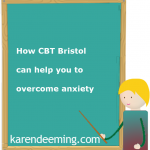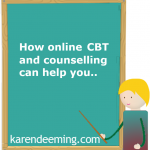
In response to Coronavirus (Covid-19), I am offering telephone, online counselling and CBT sessions via Zoom and WhatsApp.
Do you have a hectic lifestyle and want to make positive life changes but precious little time to make them?
Does any of this sound familiar?
For goodness sake, get a grip, woman. Don’t you know how lucky you are? You have zero right to be unhappy. Thousands are being murdered in Syria and you can’t even get out of bed, you self-indulgent cow. What happened to that fitness regime you promised you’d start, eh? No self-control, that’s your problem. And you haven’t replied to Jane’s texts. Jane must think you’re a crap friend. And she’s right. It’s a miracle you’ve got any friends left. Get up! You’ve got a to-do list which stretches from here to Loch Lomond. Pack the boy’s bag for camp, check Twitter. The plants on the patio are dying in their polystyrene coffins because you haven’t had time to put them in pots. Poor plants must hate you. Better check those watched eBay items. You don’t want to miss out on that incredible vintage (aka old, smelly and broken) deckchair, which is going to transform your life and usher in a new era of relaxation. Oh, dear God. I’m supposed to have handed in my review of Ruby Wax’s book to the paper. Gah! What are you going to tell them, eh? ‘Sorry, I was too stressed out to review the book about anxiety and stress?’”
Well the good news is you are not alone in this very common dilemma even the high flying journalist who wrote this article feels overwhelmed, stressed and rubbish sometimes too……
Or perhaps:
• Work takes up most of your life and you constantly feel like you are chasing your tail
• The joy has gone out of your life and you feel like you have lost your spark
• You can’t remember the last time you took a day off
• You feel like a hamster trapped in a wheel going round and round
• Been too busy is something you perceive as a sign of success or of a flourishing career
• Often you eat in tandem with other tasks and rarely take a lunch hour
• Days are so crammed full that you literally dread even starting them
• You’ve recently noticed that you are consistently more tired when you get up in the morning than you are when you go to bed
• Looking for car keys, phone, wallet, jewellry, eyeglasses, and documents become part of your daily routine
• There is so much to do that you can’t even shut your mind down when your laying in your comfy bed
• You put work first and leave everything else to the last minute such as loo breaks and GP appointments, parents’ evenings etc
• Traffic jams signal the beginning of phone meetings for you
• You continually feel like you are missing out on family life
• Often you feel guilty that you’re not there for your kids or your partner as much as you’d like to be
• You wish you didn’t feel too tired or busy to enjoy your social life
It doesn’t help either that this fast paced, quick fix, target-driven, celebrity and social media obsessed Society we currently live in is remarkably effective at brainwashing people into believing they should look a certain way, act a certain way, be a certain someone, when in reality every single one of us is different. Society pigeonholes people and wants you to believe that you have fewer rights to be happy because you do not fit an idealistic lifestyle. This toxic pigeonholing’ happens because it keeps the consumer tread mill in business, continually filling up the pockets of plastic surgeons, BMW and Mercedes, banks, estate agents and pharmaceutical companies who prescribe so called “happy pills”.
Life can be relentless, frantic and exhausting, but it doesn’t have to be this way.
With the continual interruption of texts, emails, facebook and twitter messages, there is no time to rest, relax and to consider how we really want to spend our lives and what conditions we need to create in order to make this happen. That said, some of us intentionally keep busy in order to distract ourselves from the bigger deeper questions about our existence on planet earth.
We all have a unique life purpose and plan. But contrary to this understanding, there still appears to be a, “template” and timeline that society reinforces us to follow. For those of you reading this and living in the West, I am certain that you are familiar with what that template is. We go to school, get our education, find a job, meet a partner, get married or live together, have a family and continue to support our lifestyles and pay our bills. This template may work for many people, but it can also be a trap in making us believe that life is a one size fits all kind of deal. What about those who dare to be different and choose to follow an alternative path? What if we aren’t meant to have our life roll out in that exact order and fashion? Does that mean we should feel down and out about ourselves?
Being “wired and wildly busy” provides us with a sense of importance and that we must be in demand. Of course, this may infact not be true. On a physiological level, most of us experience a rush each time we speed through work tasks and our to do lists. This can sometimes result in people getting hooked on that feeling and often becoming an adrenaline junkie. For some, speed is an ecstasy fix. Put simply we get off on speed and busyness so our bodies and brains end up yearning for it and then beginning to demand it.
21st Century life pressures us to feel like we can be everywhere and do everything and it gives us quick fix, magical tools that strengthen this false belief. Witness today’s super mums juggling the schedules of their children, work, bills and me time, how was this possible before mobile phones, email and social media? Though she is pressured, she is not bored. One part of her feels like she is indispensable consistently receiving praise for completing such a difficult task.
So, what’s the cost to our health and well-being?
It can be exciting and thrilling pushing ourselves to and often beyond the limits of how much we are capable of. That said, doing too much too quickly can be exhausting, uncalled for, and potentially dangerous, for example, phone calls whilst driving.
In our relentless overloaded world, we often feel depleted and more tired when we get up in the morning than when we go to bed. Our productivity levels and the quality of our work depreciates with speed. The quicker we approach tasks the more likely we are inclined to make errors. When we feel up and high, we ride our hectic life like a high performing surfer in the flow of a great wave, but when we’re down often we wipe out, burn ourselves out and can’t seem to overcome exhaustion. Most importantly though this has long lasting and detrimental consequences for our health and well being.
What can you do about it?
Over the next few weeks, I’ll be sharing with you the mindfulness, self help and personal development techniques and tips that helped me to:
• escape the corporate cage, that is, my well-paid secure job and hectic lifestyle in London
• move from London to live in the idylic countryside and do my dream job as a successful Psychotherapist, Coach and Mindfulness Teacher helping 1000s of clients at my Liverpool Street and Harley Street Practices and nowadays at my online, Bristol and Somerset Practices sometimes advising film Directors, such as Mike Leigh, on the authenticity of film narratives.
Though I am now doing my dream job, living in a delightful Somerset village and have many tools at my disposal, life is occasionally still tough so I’ll also send you some tips to help you remain motivated, and focused when you are feeling stuck, overwhelmed, lost or you are falling victim to ”l’m too busy and don’t have enough time” and procrastination trap.
Tip for week one
Practice the three minute mindfulness breathing space meditation not cross legged on a mountain in the Himalyas at your desk or sat upright in a chair at home, in your business hote or on the bus or tube if you live in London.
http://franticworld.com/free-meditations-from-mindfulness/
Tips for the 3 minute breathing space mindfulness practice
Whilst listening to the 3 minute mindfulness breathing space, just allow your thoughts to rise, plateau and fall and imagine that they are part of a film/tape or actors in a play coming and go or clouds in the sky and that you have the option to press the stop button at anytime.
Most importantly, remember that thoughts are not facts and are only your own interpretation of emotions and feelings and other people’s actions and so when you next experience a negative automatic thought write it down and ask yourself what evidence is there to support this thought and what evidence is there against this thought.
1. Regardless of what happens (eg if you fall asleep, lose concentration, keep thinking of other things), just do it! These are your experiences in the moment. Just be aware of them.
2. If your mind is wandering a lot, simply note the thoughts (as passing events) and then bring the mind gently back to your breathe
3. Let go of ideas of “success “, ” failure “, ” doing it well “, or “trying to purify the mind “. This is not a competition. It is not a skill for which you need to strive. The only discipline involved is regular and frequent practice. Just do it with an attitude of openness and curiosity.
4. Let go of any expectations of what the 3 minute mindfulness breathing space will do for you. Imagine it as a seed you have just planted. The more you poke around and interfere, the less it will be able to develop. So with the 3 minute mindfulness breathing space , just give it the right conditions – peace and quiet, regular and frequent practice. That is all. The more you try to influence what it will do for you, the less it will do.
5. Try approaching your experience in each moment with the attitude: “Ok that’s just the way things are right now “. If you try to fight off unpleasant thoughts, feelings and body sensations, the upsetting feelings will only distract you from doing anything else. Be aware, be non-striving, be in the moment, accept things as they are. Just do it.
Watch out for Tip 2 in the next few weeks!!!
You can book your appointment here or you can contact me on (044) +7950 751352 for outside the UK or 07950 751352 inside the UK. Alternatively by email: karen@karendeeming.com.←



![Karen_Deeminga[1]](http://www.karendeeming.com/wp-content/uploads/2015/09/being-practice-self-portrait-e1541437891746.jpg) Welcome to my site. if you have any queries then please
Welcome to my site. if you have any queries then please

